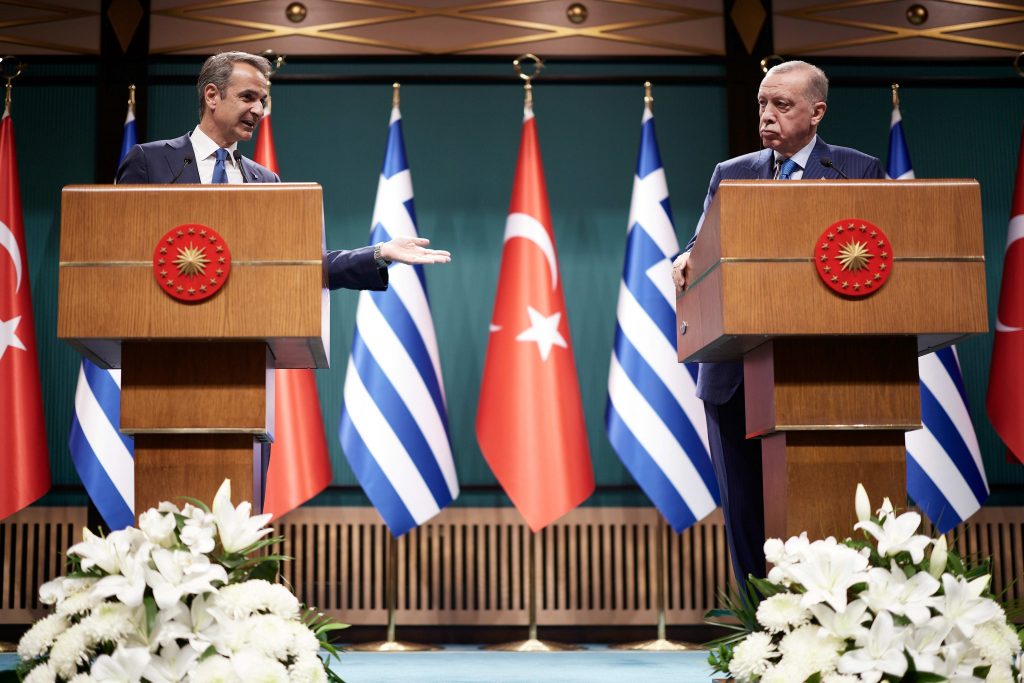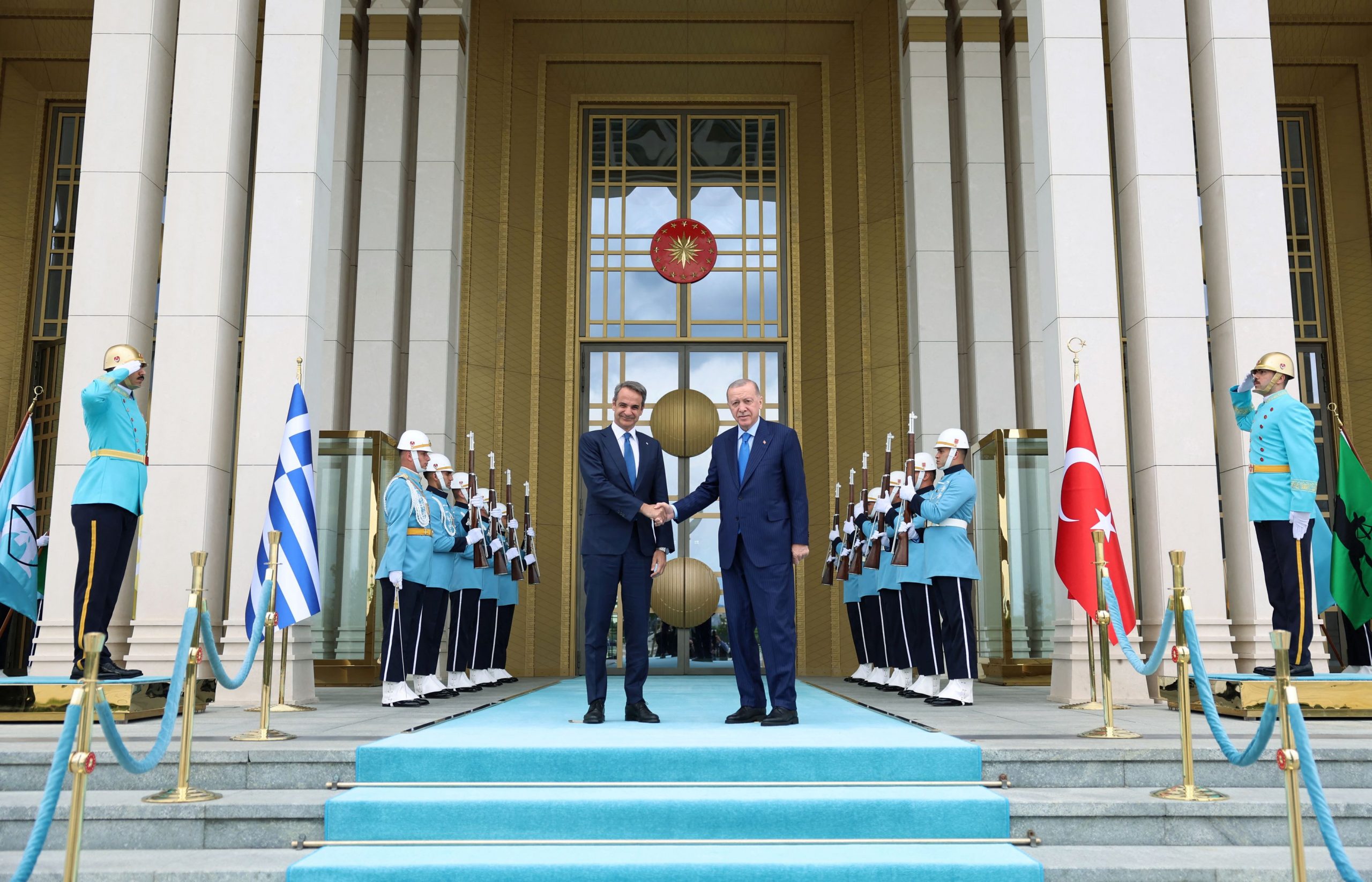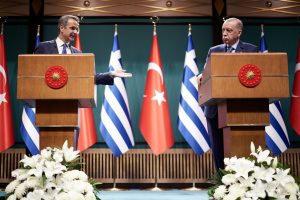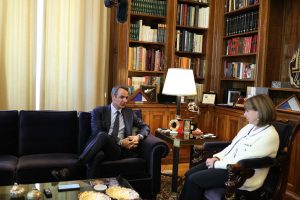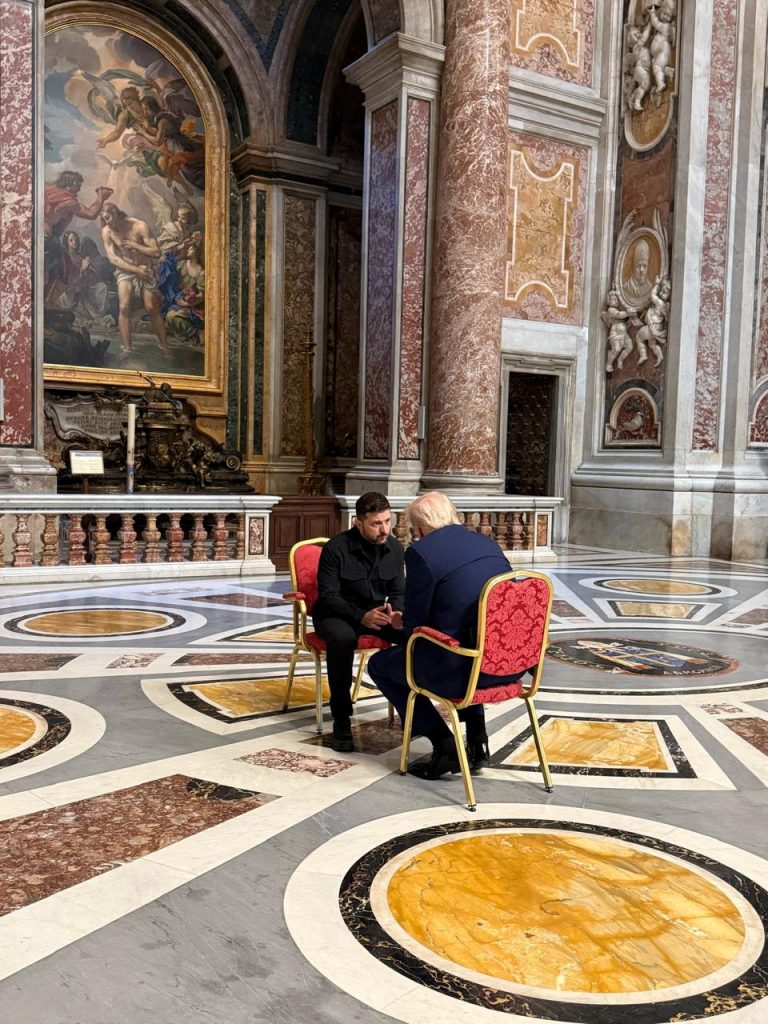The Ministries of Foreign Affairs of Greece and Turkey are charged with the heavy-lifting of maintaining the “positive agenda” between the two countries, and their constant open communication was crucial for the planning of the most recent meeting between Prime Minister Kyriakos Mitsotakis and President Recep Tayyip Erdogan in Ankara.
As a testament to their crucial roles, Greece’s Minister of Foreign Affairs Giorgos Gerapetritis and Turkey’s Minister of Foreign Affairs Hakan Fidan accompanied their countries’ leaders throughout the entire visit and were on their toes to defuse potentially volatile issues, according to reports at TO VIMA.
Some of the topics that the two countries have found particularly helpful to collaborate around, as part of the positive agenda, are issues that are considered to be of mutual benefit, including tourism, immigration, and “the highly successful Turkish visa express program in the ten Greek islands of the eastern Aegean,” said TO VIMA.
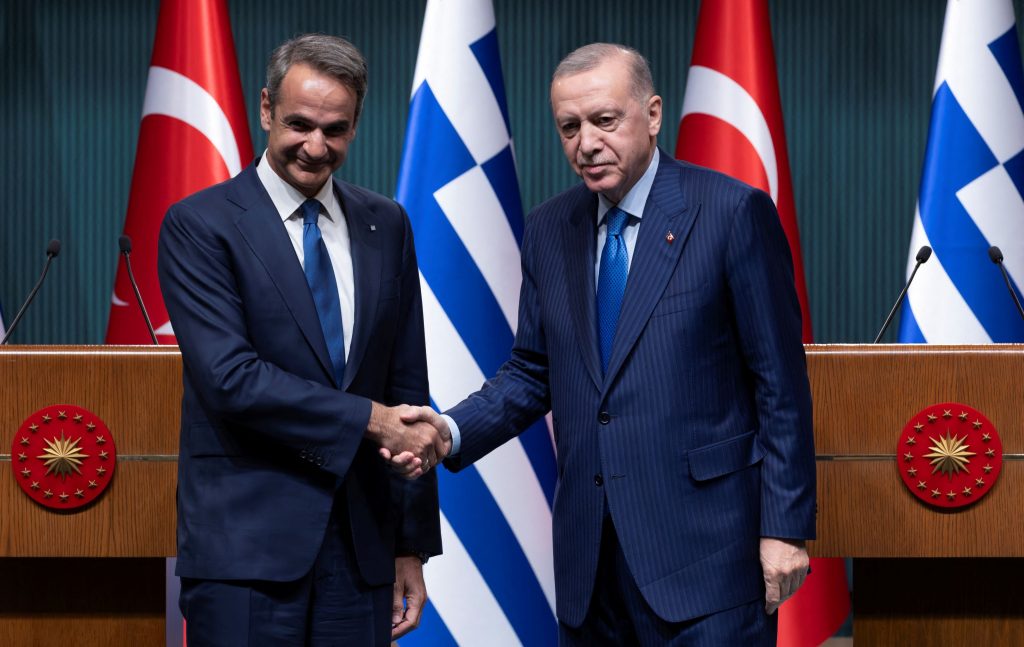
Turkey’s President Tayyip Erdogan and Greek Prime Minister Kyriakos Mitsotakis pose after a press conference at the Presidential Palace in Ankara, Turkey, May 13, 2024. REUTERS/Umit Bektas
The Greek MFA’s Take on the Meeting
In an interview with ERT TV in Greek, Gerapetritis spoke about the recent visit to Turkey and highlighted that he believes Greece-Turkey relations are entering a new age after yesterday’s meeting. He said, “without wanting to be naive”, this period is best characterized as a period of “normality”.
By ‘normality,’ he explained that the relationship between the two countries promotes regular contact between Greece and Turkey, they countries focus on the major issues at hand, and Greece and Turkey aim to discuss and disagree without allowing the disagreements to escalate into crisis, he said to ERT.
He qualified his statements, however, by adding that he has not forgotten the fairly recent challenges related to the 1.2 million refugees and migrants at the eastern border of Greece, the hostile rhetoric from Turkey to Greece, and the air battles between the two countries over the Aegean sea.
Yet, he accentuates that Greece and Turkey are now enjoying a period of unprecedented calm in the Aegean.
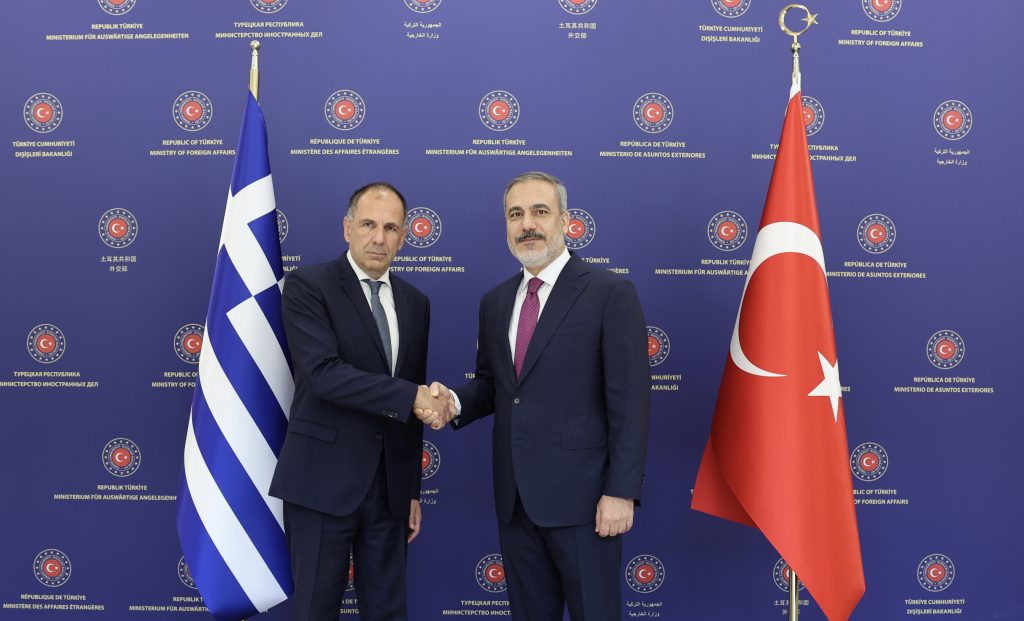
Greek Minister of Foreign Affairs Giorgos Gerapetritis meets with Turkish counterpart Hakan Fidan in Ankara, Turkey, September 5, 2023 ΑΠΕ-ΜΠΕ/TURKISH FOREIGN MINISTRY / HANDOUT/ Anadolu Agency/ MUSTAFA AYGUN
Gerapetritis told ERT, “I know that there are very strong positions of Turkey, which go back decades. What I want is for us to be able to discuss in a deliberative spirit, to be able to disagree civilly without creating tensions and judgments, and, on the other hand, to promote a positive agenda with mutually beneficial agreements that can advance our bilateral relations. No surrender of sovereignty, no discussion of sovereignty.”
Gerapetritis highlighted that “issues of sovereignty are not part of our discussions. The Turkish side may indeed have its own positions regarding sovereignty and issues that the Turkish agenda has always included. However, in our discussion, issues of sovereignty are not going to be included. Second, when it comes to exercising our own sovereign rights, there is no trade-off. Greece fully exercises its sovereignty, fully exercises its sovereign rights. It is our belief that we can discuss and find solutions to the issues without giving up any of our rights.
Reactions on the Visit by Greek Political Parties
Greek opposition leader of PASOK Nikos Androulakis offered harsh criticism of the Mitsotakis-Erdogan visit, saying that meetings and “dialogue must be held without illusions”, as reported by AMNA.
He said that, for PASOK, “the Treaty of Lausanne is written in stone and the only reality in Cyprus is the occupation,” seeming to imply that such issues cannot just swept under the rug to pursue a positive agenda.
Androulakis was also critical of Erdogan’s statement of last week that he will turn the Byzantine Chora Monastery, which is a UNESCO site, into a mosque, and called on the international community to do more to protect world heritage sites.
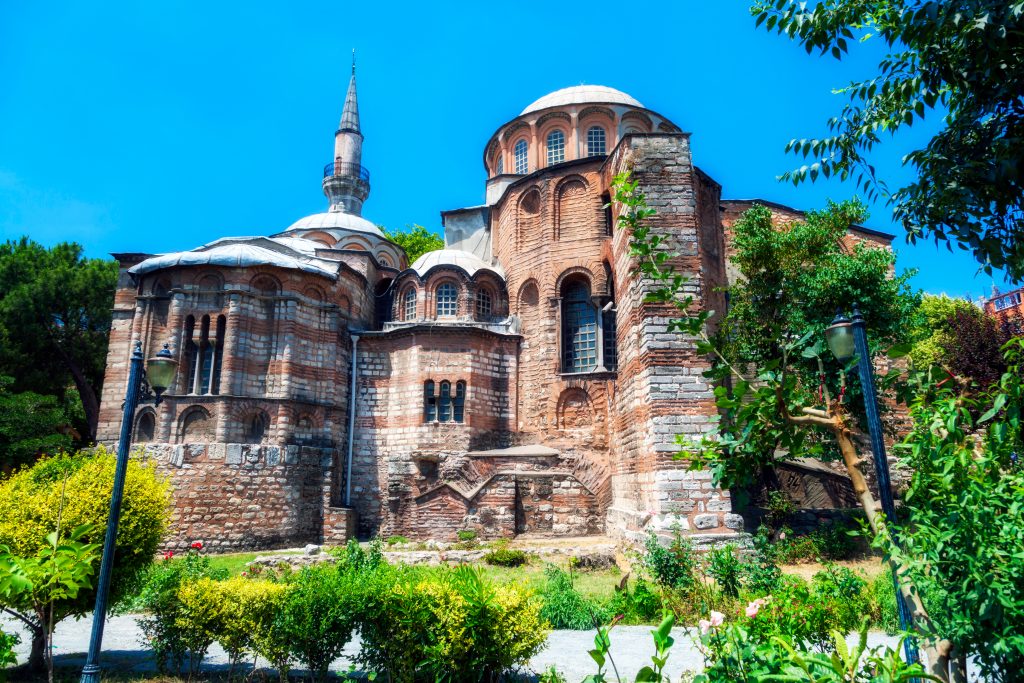
The Church of the Holy Saviour in Chora is a medieval Byzantine Greek Orthodox church preserved as the Chora Museum (14th century), Edirnekapi, Istanbul, Turkey. Shutterstock
Meanwhile, through an official announcement on the website of opposition party SYRIZA, which is presided over by Stefanos Kasselakis, SYRIZA was critical of what it calls the incumbent Greek government’s “systematic submissiveness” against Turkey. SYRIZA highlighted the Chora Monastery issue, the Cyprus issue, as well as issues of international law connected with maritime zones around Greece’s Aegean islands.
In response to statements made by Androulakis and Kasselakis, Greek Member of Parliament Dora Bakoyiannis was dismissive of their criticism in an interview on SKAI TV, and intimated that they both lack the experience to comment, which set off a row between the MP and the opposition parties.
Bakoyiannis is widely recognized as an expert in Greece-Turkey affairs and was Minister of Foreign Affairs of Greece under incumbent government New Democracy from 2006-2009.
She said, “Mr. Androulakis has never been to Ankara, possibly only as a Member of the European Parliament, and has never managed such an issue.” She also chided Kasselakis, claiming he doesn’t even understand the concept of a ‘continental shelf,’ alluding to his comment over the seemingly intractable debate over the demarcation of maritime borders between the two countries.
Commenting on the issue of Chora Monastery, which seems to be the one matter that Greece’s main political parties agree on, Bakoyiannis said that it was a “colossal mistake by Erdogan.”
The Next Meeting
According to reports at TA NEA, Gerapetritis and Fidan will meet at the sidelines of the upcoming NATO Summit, scheduled for this July in Washington DC. One of their tasks during that meeting will be to set the date for the next meeting between PM Mitsotakis and President Erdogan as well as the agenda.
